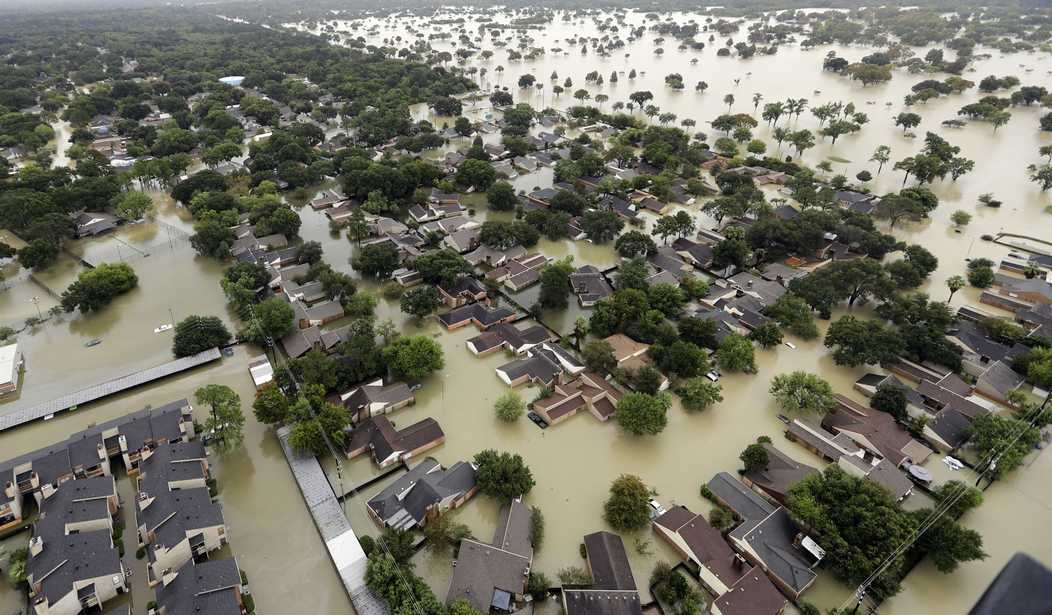Last year, hurricanes Harvey, Irma, and Maria inflicted record-breaking devastation on America, taking more than 200 lives and causing more than $200 billion in damages.
Religious communities—churches, temples, synagogues, and other houses of worship—were among the first responders helping their neighbors recover from the unprecedented storms. Before federal emergency relief could respond, the religious community was there.
Only after the water had receded and most were able to return safely to their homes did these religious organizations begin to look to their own needs. What they found was overwhelming.
Hundreds, possibly thousands, of churches, temples, synagogues, and other religious organizations were devastated. They had to gut their sanctuaries, drain community centers, and replace tens of thousands of dollars’ worth of HVAC equipment ruined in the muck and debris of the floods. How could they possibly rebuild while continuing their critical mission of mercy to their community?
Mother Nature’s fury did not discriminate, but FEMA did.
Though these organizations would otherwise qualify for FEMA’s Disaster Relief Funds, they were categorically barred from receiving emergency relief based solely on their religious status. What is more, they weren’t even allowed to apply.
My firm, First Liberty Institute, wrote to the Trump Administration on behalf of our clients requesting the unconstitutional religious ban be rescinded, as did Texas Attorney General Ken Paxton and Governor Greg Abbott. The White House ultimately brought an end to FEMA’s discriminatory policy, allowing religious entities to receive aid on the same terms as their non-religious neighbors. Smart move, since the U.S. Supreme Court has repeatedly confirmed that denying a benefit solely on account of religious identity is, in fact, religious discrimination.
Recommended
Last week, Congress responded to President Trump’s administrative action by approving the Bipartisan Budget Agreement (“BBA”). The BBA ends the religious discrimination of the past, and makes clear that houses of worship will be able to participate with FEMA’s vital disaster assistance, the key to ensuring that religious nonprofits will be able to rebuild and serve their communities for years to come.
And this is a worthwhile investment because, as Greg Forrester—the president and CEO of the National Voluntary Organizations Active in Disaster—explains, religious nonprofits account for roughly 80 percent of national disaster recovery efforts.
FEMA comes in behind natural disasters. But houses of worship and other religious nonprofits meet the immediate needs of their local communities. In terms of real dollars, according to Forrester, the aid religious communities render would increase disaster funding by billions if they weren’t there.
FEMA’s former director of the Center for Faith-Based & Neighborhood Partnerships at the Department of Homeland Security, Jamie Johnson, considered collaboration with faith-based nonprofits critical to FEMA’s success. By ensuring houses of worship are made whole, Congress guarantees they will be prepared to serve their communities should another disaster strike.
Even state government benefits under the BBA. States are able to credit the cash value of volunteer labor towards the required percentage of funding a state must match with federal disaster aid. The hundreds of thousands of tireless volunteer hours performed by houses of worship and religious nonprofits in the wake of every natural disaster saves damaged states millions of dollars that can freed to benefit citizens in other ways.
The benefits these religious organizations bring to recovering communities are immeasurable, which is why the discrimination of previous FEMA policies was such a travesty, and why the BBA’s overdue reform is so welcome.
Thanks to the Trump administration, and the swift action of Congress, thousands of houses of worship are again eligible for FEMA relief just like everyone else.

























Join the conversation as a VIP Member